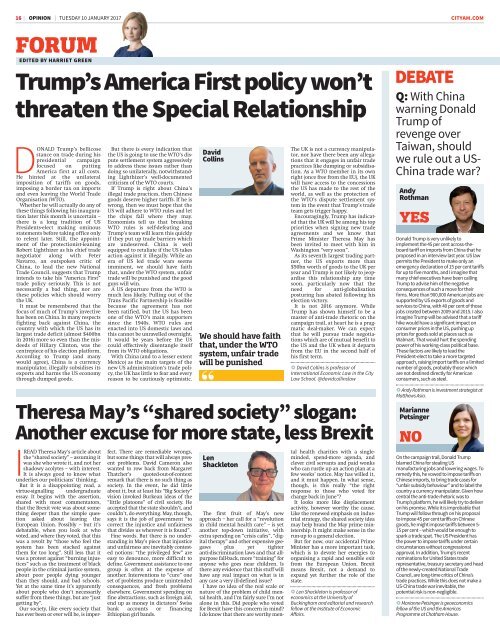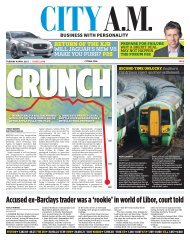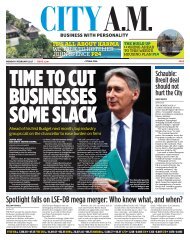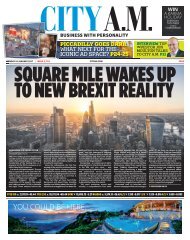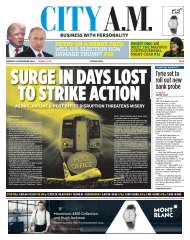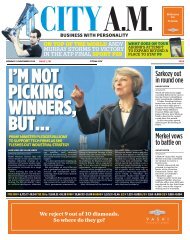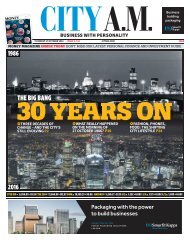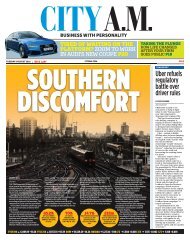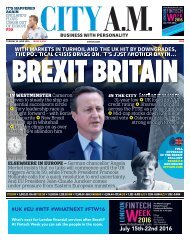Create successful ePaper yourself
Turn your PDF publications into a flip-book with our unique Google optimized e-Paper software.
16 OPINION TUESDAY 10 JANUARY 2017<br />
CITYAM.COM<br />
FORUM<br />
EDITED BY HARRIET GREEN<br />
Trump’s America First policy won’t<br />
threaten the Special Relationship<br />
DONALD Trump’s bellicose<br />
stance on trade during his<br />
presidential campaign<br />
focused on putting<br />
America first at all costs.<br />
He hinted at the unilateral<br />
imposition of tariffs on goods,<br />
imposing a border tax on imports<br />
and even leaving the World Trade<br />
Organisation (W<strong>TO</strong>).<br />
Whether he will actually do any of<br />
these things following his inauguration<br />
later this month is uncertain –<br />
there is a long tradition of US<br />
Presidents-elect making ominous<br />
statements before taking office only<br />
to relent later. Still, the appointment<br />
of the protectionist-leaning<br />
Robert Lighthizer as his chief trade<br />
negotiator along with Peter<br />
Navarro, an outspoken critic of<br />
China, to lead the new National<br />
Trade Council, suggests that Trump<br />
intends to take his “America First”<br />
trade policy seriously. This is not<br />
necessarily a bad thing, nor are<br />
these policies which should worry<br />
the UK.<br />
It must be remembered that the<br />
focus of much of Trump’s invective<br />
has been on China. In many respects<br />
fighting back against China, the<br />
country with which the US has its<br />
largest trade deficit (almost $400bn<br />
in 2016) more so even than the misdeeds<br />
of Hillary Clinton, was the<br />
centrepiece of his election platform.<br />
According to Trump (and many<br />
would agree), China is a currency<br />
manipulator, illegally subsidises its<br />
exports and harms the US economy<br />
through dumped goods.<br />
IREAD Theresa May’s article about<br />
the “shared society” – assuming it<br />
was she who wrote it, and not her<br />
shadowy acolytes – with interest.<br />
It is always good to know what<br />
underlies our politicians’ thinking.<br />
But it is a disappointing read, a<br />
virtue-signalling undergraduate<br />
essay. It begins with the assertion,<br />
shared with most commentators,<br />
that the Brexit vote was about something<br />
deeper than the simple question<br />
asked about leaving the<br />
European Union. Possibly – but it’s<br />
debatable, when you look at who<br />
voted, and where they voted, that this<br />
was a revolt by “those who feel the<br />
system has been stacked against<br />
them for too long”. Still less that it<br />
was a protest against “burning injustices”<br />
such as the treatment of black<br />
people in the criminal justice system,<br />
about poor people dying younger<br />
than they should, and bad schools.<br />
Yet at the same time it’s apparently<br />
about people who don’t necessarily<br />
suffer from these things, but are “just<br />
getting by”.<br />
Our society, like every society that<br />
has ever been or ever will be, is imper-<br />
But there is every indication that<br />
the US is going to use the W<strong>TO</strong>’s dispute<br />
settlement system aggressively<br />
to address these issues rather than<br />
doing so unilaterally, notwithstanding<br />
Lighthizer’s well-documented<br />
criticism of the W<strong>TO</strong> courts.<br />
If Trump is right about China’s<br />
illegal trade practices, then Chinese<br />
goods deserve higher tariffs. If he is<br />
wrong, then we must hope that the<br />
US will adhere to W<strong>TO</strong> rules and let<br />
the chips fall where they may.<br />
Economists tell us that breaking<br />
W<strong>TO</strong> rules is self-defeating and<br />
Trump’s team will learn this quickly<br />
if they put up trade barriers which<br />
are undeserved. China is well<br />
equipped to retaliate if the US takes<br />
action against it illegally. While an<br />
era of US led trade wars seems<br />
imminent, we should have faith<br />
that, under the W<strong>TO</strong> system, unfair<br />
trade will be punished and the good<br />
guys will win.<br />
A US departure from the W<strong>TO</strong> is<br />
much less likely. Pulling out of the<br />
Trans Pacific Partnership is feasible<br />
because the agreement has not<br />
been ratified, but the US has been<br />
one of the W<strong>TO</strong>’s main supporters<br />
since the 1940s. W<strong>TO</strong> rules are<br />
enacted into US domestic laws and<br />
this cannot be unravelled overnight.<br />
It would be years before the US<br />
could effectively disentangle itself<br />
from its W<strong>TO</strong> obligations.<br />
With China (and to a lesser extent<br />
Mexico) as the main targets of the<br />
new US administration’s trade policy,<br />
the UK has little to fear and every<br />
reason to be cautiously optimistic.<br />
fect. There are remediable wrongs,<br />
but some things that will always present<br />
problems. David Cameron also<br />
wanted to row back from Margaret<br />
Thatcher’s quoted-out-of-context<br />
remark that there is no such thing as<br />
society. In the event, he did little<br />
about it, but at least his “Big Society”<br />
vision invoked Burkean ideas of the<br />
“little platoons” of civil society. He<br />
accepted that the state shouldn’t, and<br />
couldn’t, do everything. May, though,<br />
says it is the job of government “to<br />
correct the injustice and unfairness<br />
that divides us wherever it is found”.<br />
Fine words. But there is no understanding<br />
in May’s piece that injustice<br />
and unfairness are inevitably contested<br />
notions: “the privileged few” are<br />
easy to denounce, more difficult to<br />
define. Government assistance to one<br />
group is often at the expense of<br />
another. Interventions to “cure” one<br />
set of problems produce unintended<br />
consequences, and fresh problems<br />
elsewhere. Government spending on<br />
fine abstractions, such as foreign aid,<br />
end up as money in dictators’ Swiss<br />
bank accounts or financing<br />
Ethiopian girl bands.<br />
David<br />
Collins<br />
We should have faith<br />
that, under the W<strong>TO</strong><br />
system, unfair trade<br />
will be punished<br />
The UK is not a currency manipulator,<br />
nor have there been any allegations<br />
that it engages in unfair trade<br />
practices like dumping or subsidisation.<br />
As a W<strong>TO</strong> member in its own<br />
right (once free from the EU), the UK<br />
will have access to the concessions<br />
the US has made to the rest of the<br />
world, as well as the protection of<br />
the W<strong>TO</strong>’s dispute settlement system<br />
in the event that Trump’s trade<br />
team gets trigger happy.<br />
Encouragingly, Trump has indicated<br />
that the UK will be among his top<br />
priorities when signing new trade<br />
agreements and we know that<br />
Prime Minister Theresa May has<br />
been invited to meet with him in<br />
Washington “very soon”.<br />
As its seventh largest trading partner,<br />
the US exports more than<br />
$50bn worth of goods to the UK per<br />
year and Trump is not likely to jeopardise<br />
this relationship any time<br />
soon, particularly now that the<br />
need for anti-globalisation<br />
posturing has abated following his<br />
election victory.<br />
It is not 2016 anymore. While<br />
Trump has shown himself to be a<br />
master of anti-trade rhetoric on the<br />
campaign trail, at heart he is a pragmatic<br />
deal-maker. We can expect<br />
that he will pursue trade negotiations<br />
which are of mutual benefit to<br />
the US and the UK when it departs<br />
from the EU in the second half of<br />
his first term.<br />
£ David Collins is professor of<br />
International Economic Law in the City<br />
Law School. @davidcollinslaw<br />
Theresa May’s “shared society” slogan:<br />
Another excuse for more state, less Brexit<br />
Len<br />
Shackleton<br />
The first fruit of May’s new<br />
approach – her call for a “revolution<br />
in child mental health care” – is yet<br />
another top-down initiative, with<br />
extra spending on “crisis cafes”, “digital<br />
therapy” and other expensive geegaws<br />
plus yet tighter<br />
anti-discrimination laws and that allpurpose<br />
fall-back, more “training” for<br />
anyone who goes near children. Is<br />
there any evidence that this stuff will<br />
have any real impact on what is in<br />
any case a very ill-defined issue?<br />
I have no idea of the real scale or<br />
nature of the problem of child mental<br />
health, and I’m fairly sure I’m not<br />
alone in this. Did people who voted<br />
for Brexit have this concern in mind?<br />
I do know that there are worthy mental<br />
health charities with a singleminded,<br />
spend-more agenda, and<br />
clever civil servants and paid wonks<br />
who can rustle up an action plan at a<br />
few weeks’ notice. May has willed it,<br />
and it must happen. In what sense,<br />
though, is this really “the right<br />
response to those who voted for<br />
change back in June”?<br />
It looks more like displacement<br />
activity, however worthy the cause.<br />
Like the renewed emphasis on industrial<br />
strategy, the shared society idea<br />
may help brand the May prime ministership.<br />
It might make sense in the<br />
run-up to a general election.<br />
But for now, our accidental Prime<br />
Minister has a more important task,<br />
which is to devote her energies to<br />
organising a rapid and sensible exit<br />
from the European Union. Brexit<br />
means Brexit, not a demand to<br />
expand yet further the role of the<br />
state.<br />
£ Len Shackleton is professor of<br />
economics at the University of<br />
Buckingham and editorial and research<br />
fellow at the Institute of Economic<br />
Affairs.<br />
DEBATE<br />
Q: With China<br />
warning Donald<br />
Trump of<br />
revenge over<br />
Taiwan, should<br />
we rule out a US-<br />
China trade war?<br />
Andy<br />
Rothman<br />
YES<br />
Donald Trump is very unlikely to<br />
implement the 45 per cent across-theboard<br />
tariff on imports from China that he<br />
proposed in an interview last year. US law<br />
permits the President to make only an<br />
emergency declaration of 15 per cent tariffs<br />
for up to five months, and I imagine that<br />
many chief executives have been calling<br />
Trump to advise him of the negative<br />
consequences of such a move for their<br />
firms. More than 900,000 American jobs are<br />
supported by US exports of goods and<br />
services to China, with 40 per cent of those<br />
jobs created between 2009 and 2015. I also<br />
imagine Trump will be advised that a tariff<br />
hike would have a significant impact on<br />
consumer prices in the US, pushing up<br />
prices for goods sold at places such as<br />
Walmart. That would hurt the spending<br />
power of his working-class political base.<br />
These factors are likely to lead the<br />
President-elect to take a more targeted<br />
approach, raising import tariffs on a limited<br />
number of goods, probably those which<br />
are not destined directly for American<br />
consumers, such as steel.<br />
£ Andy Rothman is investment strategist at<br />
Matthews Asia.<br />
Marianne<br />
Petsinger<br />
NO<br />
On the campaign trail, Donald Trump<br />
blamed China for stealing US<br />
manufacturing jobs and lowering wages. To<br />
remedy this, he vowed to impose tariffs on<br />
Chinese imports, to bring trade cases for<br />
“unfair subsidy behaviour” and to label the<br />
country a currency manipulator. Given how<br />
central the anti-trade rhetoric was to<br />
Trump’s platform, he will likely try to deliver<br />
on his promise. While it is improbable that<br />
Trump will follow through on his proposal<br />
to impose 45 per cent tariffs on Chinese<br />
goods, he might impose tariffs between 5-<br />
15 per cent – which would be enough to<br />
spark a trade spat. The US President has<br />
the power to impose tariffs under certain<br />
circumstances without congressional<br />
approval. In addition, Trump’s recent<br />
nominations for United States trade<br />
representative, treasury secretary and head<br />
of the newly-created National Trade<br />
Council, are long-time critics of China’s<br />
trade practices. While this does not make a<br />
US-China trade war inevitable, the<br />
potential risk is non-negligible.<br />
£ Marianne Petsinger is geoeconomics<br />
fellow of the US and the Americas<br />
Programme at Chatham House.


